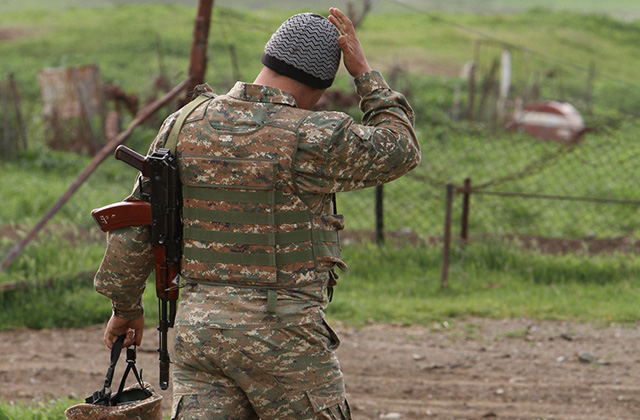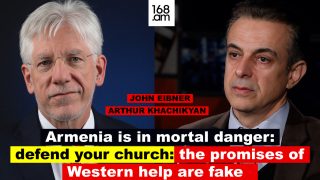Russia Intensifies Tension

Russian political and news circles have fallen into convulsions against the background of RA NA draft law on recognition of Artsakh Republic. Immediately after RA Government approved the draft conclusion “On recognition of Artsakh Republic,” although it’s not clear when the draft law will be discussed in RA NA Standing Committee on Foreign Relations, being included in RA NA agenda, Russian officials, not giving turn to one another, hurried to reflect on draft law implications—threatening with war to the Armenian side. Sergey Lavrov, RA MFA, was the first to touch upon the draft law, stating there is no reason in making a stir around the draft law submitted by Armenian MPs, as Yerevan assures that status of Nagorno-Karabakh won’t be unilaterally resolved.
“As for discussions on recognition of Nagorno-Karabakh, Armenia doesn’t discuss it, does it? It’s a proposal made by two MPs. And RA Government, pursuant the law, as they explain to everyone, by calming down the situation, should develop a conclusion on the draft law. I think, it’s senseless making noise and causing panic,” Lavrov said.
In his turn, Dmitri Peskov, RF presidential spokesman, stressed that Moscow attentively follows the process of adoption of the draft law on recognition of Artsakh Republic by the Government. In his words, the draft law wasn’t discussed with Moscow. “No, it wasn’t discussed with Moscow. We attentively follow resolutions, adopted in this context. We still hope, that the conflicting parties will avoid steps, which will violate the fragile ceasefire and lead to increase in Karabakh tension,” Peskov said.
Leonid Slutsky, First Deputy Chairman of the Committee on International Affairs, was more spirited regarding this issue, stating that recognition of NK by Yerevan may lead to new violence escalation on the border. In his words, Yerevan’s disposition has always been directed to recognition of Nagorno-Karabakh, which contradicts the disposition by the Azerbaijani side and doesn’t approach the conflicting parties to the settlement. Slutsky stated the contrary—according to Yerevan, the draft law may enshrine independence of Nagorno-Karabakh and lead to sharp counteraction by official Baku.
“After negative reflections from Moscow and Baku, RA Government “withdrew” from the draft law on NKR recognition,” Russian Gazeta.ru reported, making reference to its sources. According to the website, likewise resolution threatens the region with a new war, which in early April edified wide-scale clashes. “Sources of both Armenia and Azerbaijan state, that the two waited for a signal from Moscow, which is considered the main arbiter for NK conflict. Judging from the statement by Russia, the latter is against military escalation and negatively refers to NKR recognition draft law. Probably, this made Yerevan quickly withdraw from the initiative,” the website reported.
Aghasi Yenokyan, Director of the Armenian Center for Political and International Studies, agrees on the latter. He told 168.am, that reflection of Russian media outlets and officials simply shows that Armenia rejected the draft law under Russia’s pressure. “This speaks of the fact, that, probably, Peskov was right while stating, that Armenia didn’t coordinate this issue with Russia. This is dangerous, as Armenia agrees all its steps with Russia, and currently observing that Moscow doesn’t keep its promise, decided not to coordinate one issue with Moscow, which failed. All recent steps, interviews and observations are mainly coordinated with Moscow,” A.Yenokyan said. In his conviction, Russia intends to increase the conflict between the two states by the law of a swing. “It turns out, by the first attack of Azerbaijan, it failed to settle its issue and, currently, it tries to increase the contrasts between the two states up to a tension, in case of which it’ll be impossible to establish peace without Russia,” Yenokyan said. In his words, three conditions set by the Armenian side, also mean serving to Russian interests, as by the first war Russia saw, that the sides were able to choose by their own means not to continue the war, thus, it’s necessary to deepen the conflict, to increase the war wave, when it will no more be possible to reach to peace.
“It’ll be impossible to return to negotiations due to dispositions by the sides, currently it’s necessary to activate other mediators, even beyond OSCE MG, as we observe—Russia doesn’t want peaceful settlement, and new attacks will be recorded, as the sides didn’t settle the political issue, the war more sharpened the feeling of the issue being unsettled. Moreover, by this attack, Azerbaijan didn’t record a resounding victory, and Armenia failed to prove, that it confidently controls the situation. I consider, new attack is inevitable,” Yenokyan said.
Gevorg Melikyan, political analyst, told 168.am it’s difficult to make anticipations. According to him, the Armenian side should implement a few steps, one of which is as follows: Armenia should bring Nagorno-Karabakh into the foreground. “Armenia seems to bear great responsibility, however, on the other hand, NK may enter into the game, and disposition by the Armenian side might have been more grounded, have higher value, when the people, for the rights of which we’re fighting, spoke and expressed their standpoint, replied to the Azerbaijani side, reflected through their spokespersons, and Armenia didn’t repeatedly speak in name of NK,” Melikyan said.
In his assessment, a rather crucial situation has been established for Azerbaijan: what is should do, if Armenia hints it’ll recognize NK independence. “Rather serious rearrangements in all aspects will occur here, Armenia should review its relations with Russia. Activities by OSCE MG should also be reviewed to some extent, i.e. serious paradigm changes will be recorded, however, I don’t consider, that NK independence recognition should be turned into a means, it’s a purpose, and not means. I see a threat here, as the Armenian side makes this issue a means to counteract Azerbaijan. In fact, if I’m not mistaken, either consolidation or recognition was a goal for the Armenian side. This means the fighting was for the self-determination of Karabakhi people, and presently it seems to become a means, but for which purpose? This became unclear for me. If this was a purpose, however, we repeatedly attempt to make it a subject for negotiations, then to reach which purpose? If we lay the issue of NK status on the table, time has come for Armenia to decide what it wants,” Melikyan concluded. In his words, there is a potential for calculated and proper steps, otherwise Armenia’s diplomacy will be entrapped.
By Araks Martirosyan

























